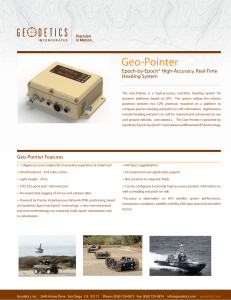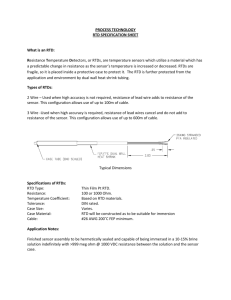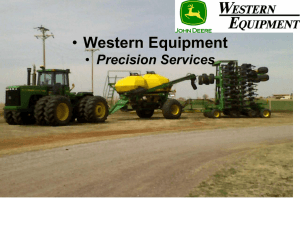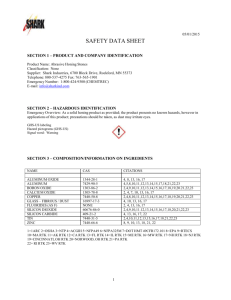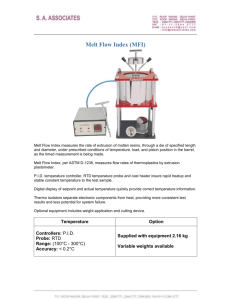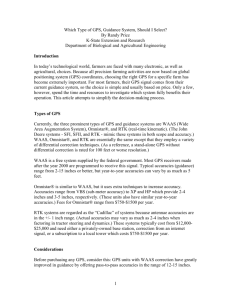RTD Surveying
advertisement
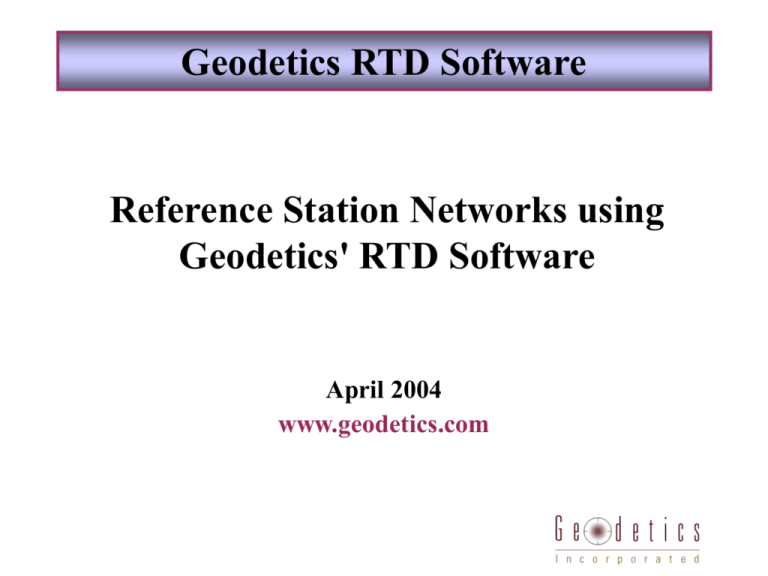
Geodetics RTD Software Reference Station Networks using Geodetics' RTD Software April 2004 www.geodetics.com About Geodetics Geodetics, Inc. is a software company based in La Jolla, California. It specializes in high-precision, real-time position and navigation solutions based on its proprietary Epoch-by-Epoch™ technology. Geodetics and Thales Navigation have partnered to offer a network RTK solution. RTD Family of Products RTD-Pro: Continuous monitoring of static/dynamic dual-frequency GPS receivers operating in a network including server/client connectivity enabling Epoch-by-Epoch™ RTK. RTD-Net : Solution for continuous monitoring of permanent GPS networks operating dual-frequency receivers. Excludes server/client connectivity. RTD-L1: For short-baseline deformation monitoring applications. RTD-Data: Receiver control and data storage functionality without network processing. RTD-Postprocess: Fully automated GPS post-processing software. RTD-Vector: Fully automated GPS based attitude determination software system RTD-Clients: Epoch-by-Epoch™ processing for client side. Geodetics’ Applications Fleet Tracking Structure Monitoring RTK Surveying Precise Navigation Deformation Monitoring Marine Single Baseline RTK 10-20 km radius Single RTK Rover Single RTK Base Issues with Single Baseline RTK Overhead: Must own, setup and survey base station Availability: Single point of failure Reliability: No redundancy (i.e. multiple determination) Accuracy: Limited range (10-20 km) and baseline dependent Initialization/Re-initialization: Seconds to minutes Security: Must attend temporary base station Productivity/Efficiency: Low (see all of the above) Flexibility: Mixing of receivers/antennas problematic Solution: Network RTK with Geodetics RTD software Fully automated GPS sensor network software for multiple static and dynamic platforms RTD is a fully automated client-server application designed for realtime, high-precision GPS sensor tracking applications. RTD uses Geodetics proprietary Epoch-by-Epoch™ algorithms that provide instantaneous integer-cycle phase ambiguity resolution. The RTD server centrally controls a network of GPS base stations through a full suite of data communication, processing, and archiving functions. Data are made available to multiple clients through the Internet for real-time positioning with centimeter-level accuracies. Common RTD User Interface Network Integrity Monitoring RTD Platform Independent On-The-Fly Adjustments for Static/Dynamic Reference Stations RTD Server/Client Architecture Server Field Client Wireless •Standard RTK •Enhanced RTK •Smart Client Supports RTCM, CMR and CMR+ RTK Formats Platform Independent RTK Clients Operating in OCRTN Trimble 5700 Leica SR530 Ashtech Z-Extreme Geodetics Smart Client RTD-Pro Demo RTD Reference Network Hardware Independent Real-Time Demo Advantages over Single Baseline RTK Overhead: Reference station infrastructure fixed and supported Availability: Eliminates single point of failure Reliability: Enables multiple determination for high reliability Accuracy: Extended range (50 km) Initialization/Re-initialization: Instantaneous with EBE Security: No need to attend reference stations Productivity/Efficiency: high (see all of the above) Flexibility: Mixing of receivers/antennas handled by system Advantages over Single Baseline RTK Network RTK Benefits • Multiple Beneficiaries (for example) • Surveyors • GIS Data Collectors • City Services (Fleet Management/Asset Tracking) • • • • • Get More Work Done With Same Crew Size Autonomous Field Crews Reference Coordinates are Known/Controlled by System Operator Potential Revenue Generator The System could pay for itself within one or two years through increased efficiency, reduced labor, and savings related to hardware purchases Geodetics Client RTK Client computes Epoch-by-Epoch™ (instantaneous) solutions. Multiple simultaneous baselines computed. Utilizes any reference receiver (does not require RTK software). Can utilize L1 only receivers on short baselines ( < 5km). Epoch-by-Epoch™ technology with Carlson SurvCE will provide a Works on laptops, tablet PC’s and Turnkey surveying solution with network connectivity. PDA’s. Solution: Network RTK with Geodetics RTD software Integer-cycle phase ambiguities are resolved independently at each epoch for a network of GPS receivers. Relative site positions estimated to cm-precision with only a single epoch of GPS data from 5 or more satellites, providing “true” RTK. Special treatment of atmospheric effects on client allows extended range several times the maximum distance achieved by RTK systems. Uses “real” reference stations. Nothing “virtual” about it. Other Features Designed specifically environments. for real-time wireless networked Works with geodetic-quality GPS receivers (dual and single frequency). Accuracy gracefully degraded based on GPS data availability at each epoch. Precise relative positioning of moving platforms (no base station required). Epoch-by-Epoch™ vs Traditional RTK Immediate (one-epoch) initialization and re- initialization vs. 15 seconds to several minutes, for ambiguity fixing. Unaffected by cycle-slips and constellation changes. Easier to detect and reject erroneous data points Multiple vs. single base receiver operations Extended range RTD-Postprocessing Postprocess Demo RTD-Vector Vector Demo Deformation Monitoring in New Zealand Geodetics’ RTD software with Epoch-byEpoch™ positioning was used to analyze the New Zealand National GPS Network with a spatial extent of ~ 1500 km. The network spans the North and South Islands, with a maximum site separation of 500 km. The following are the analysis results: Single epoch precision is comparable to networks of smaller extent (1-2 cm in the horizontal, 5-10 cm in the vertical). The scatter of the hourly medians is well below 1 cm in the horizontal components and 1-2 cm in the vertical. The Epoch-by-Epoch™ troposphere estimates are very clean. The number of outliers (> 3 s) is very small for the entire data set (about 0.1%). 24 hour RTD solution Dam Deformation: Diamond Valley Lake Largest water reservoir in southern California - 6 mo. emergency water supply. Three earthen dams 7 Leica receivers sampling at 1 Hz Maximum distance 8 km Data streaming by radio modems Real-time instantaneous solutions with RTD, with alarming features. Internet accessible Raw data and photo courtesy of Mike Duffy and Cecilia Whitaker, Metropolitan Water District of Southern California Competition RTD vs. VRS Feature Operation - Time to fix RTD Epoch-by-Epoch™ Instantaneous VRS Rapid Static 15sec – 4min (depends on rover RTK) Operation – Extended range Up to 50Km baseline with L1/L2. Up to 5Km with L1 only Unclear Robustness - Simultaneous computation of multiple baselines Yes (limited by bandwidth) No Robustness - Base station movement assumption Yes No - Assumed fixed base station coordinates Price - Independent of number of clients Yes No Applications - Suitable for dynamic applications (UPS, trash collection, AVL etc…) Yes. Epoch-by-Epoch™ is ideally suited to dynamic applications Not optimal. RTD Installations (partial list) Minimum System Requirements • • One Reference Station With Data Link to Central Processing Facility (maximum 30 stations). Modem/DSL/TCP/Radio RTD Processing Server (Windows NT, 2000, XP) • 1 GHz Processor, 512 MB RAM, 40 GB HD, Windows • • • Communications from client to server (wireless modem – GSM/CDPD/GPRS) Optional for extended range, Epoch-by-Epoch™ positioning: PDA with Geodetics Smart Client. Additional sites can be added to existing network easily. Geodetics, Inc. provides Epoch-by-Epoch™ positioning and navigation products for extended range, high-precision, real-time applications www.geodetics.com Tel: (858) 729-0872

